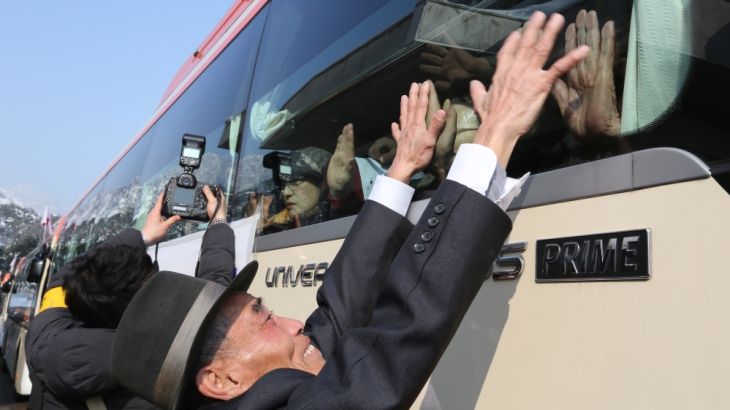Hopes fading for reunion of Korean families
As part of the inter-Korean talks last month, South Korea proposed a reunion of families separated by the Korean War.

Seoul, South Korea – Despite the inter-Korean talks last month that resulted in the North’s participation in the Pyeongchang Winter Olympics, uncertainty still surrounds proposed family reunions due to take place over the Lunar New Year.
Officials from both sides of the border held talks on January 9 and South Korea had hoped a reunion of the families separated by the 1950-53 Korean War would take place this month, the first such event since 2015.
Keep reading
list of 4 itemsZelenskyy says Olympics chief should visit Ukraine front line
Arif Khan: A Kashmiri youth’s struggle for Olympic dream
Photos: Curtain closes on Paralympics as China and Ukraine star
Out of the 131,447 individuals in South Korea who have registered with the Korean Red Cross since 1988 as having family in the North, more than 72,000 have died.
Almost 14,000 of those alive are aged 90 and above. For them, time is running out.
“I signed up for a reunion 30 years ago but have yet to be picked for one,” 80-year-old Nam Gyu-hyeong told Al Jazeera.
“While I would still like to be part of a reunion, I think the Red Cross and the authorities should’ve done something earlier. For me, there isn’t much time left. Five of the nine people I fled North Korea with are dead already.”
Families gathered at the Imjingak Resort in South Korea to pay respect to their ancestors over the Lunar New Year. For those who have been separated by the Korean War, it can be a painful time.
Many do not know if their loved ones in the North are dead or alive.
But this ritual offers these families a physical proximity to their homes and the solace of comfort from others with the mountains of North Korea on the horizon.
“Not many of those are alive now and soon we will all be gone,” Kim Yong-ha, president of Tongil Kyoungmohui, said.
“Our wish is to have people visit their homes. The second and third generation will forget about their grandparents’ stories. We should all know about our roots.”
North Korea has sent an Olympics delegation to Pyeongchang and the two squads walked under the unified flag at the opening ceremony. The Koreas have also formed a joint female ice hockey team.
However, according to Jung Jae-eun, deputy head of Korean Red Cross’ Inter-Korean Cooperation, the reunions and humanitarian diplomacy depends on the general trend of North-South relations.
“Since 2008, there have been fewer face-to-face and video reunions,” she said.
“The figures of separated families here in South Korea are those who have voluntarily registered for the reunions. The actual number is quite different. A lot of individuals didn’t register because they don’t want to endanger the lives of their families in the North.”
Jung said reunions were set as the main agenda for the government and the Red Cross for the year, and the momentum created by the Korean talks under the Winter Olympics banner was being used to push the case forward.
“It’s a shame nothing was agreed on during the talks last month but, from our side, we are preparing and planning for a lot of reunions in 2018.”
No progress
While the January talks signalled a thaw in relations between the two countries, there has been no progress yet on the South’s reunion proposal.
In response to the request last month, North Korea demanded the repatriation of 12 of its restaurant workers who defected to the South in 2016. Seoul declined, saying the individuals had defected of their own will.
Not everyone, however, is looking forward to a reunion.
“Anyone who wants to be part of this reunion system is an idiot,” 64-year-old Kim Yong-hwa, chairman of the North Korean Refugees Human Rights Association of Korea, said.
“In North Korea, you don’t want to be part of this because once you enroll, you are put under heavy surveillance. If South Koreans really want to meet their families, they can use the backdoor. If you go through this system, the families in the North will be under the radar. They don’t understand the regime they are dealing with.
“Kim Jong-un is someone who doesn’t understand the concept of family. He killed my family. He killed members of his own family.”
With additional reporting by Natasha Ghoneim in Paju, South Korea
|
|